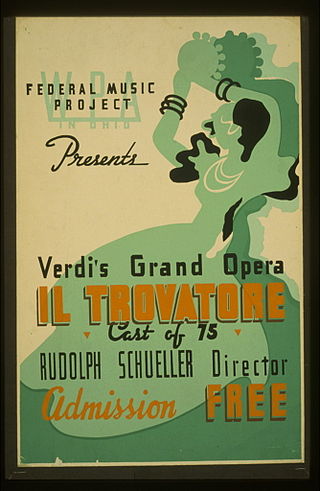
This is a list of notable events in music that took place in the year 1937.
This is a list of notable events in music that took place in the year 1939.
This is a list of notable events in music that took place in the year 1935.

Luther Ronzoni Vandross Jr. was an American soul and R&B singer, songwriter, and record producer. Throughout his career, he achieved eleven consecutive RIAA-certified platinum albums and sold over 40 million records worldwide. Known as the "Velvet Voice", Vandross has been recognized as one of the 200 greatest singers of all time (2023) by Rolling Stone, as well as one of the greatest R&B artists by Billboard. In addition, NPR named him one of the 50 Great Voices. He was the recipient of eight Grammy Awards, including Song of the Year in 2004 for a track recorded not long before his death, "Dance with My Father". In 2021, he was posthumously inducted into the National Rhythm & Blues Hall of Fame.

The Wiz: The Super Soul Musical "Wonderful Wizard of Oz" is a musical with music and lyrics by Charlie Smalls and book by William F. Brown. It is a retelling of L. Frank Baum's children's novel The Wonderful Wizard of Oz (1900) in the context of contemporary African-American culture. It opened on October 21, 1974, at the Morris A. Mechanic Theatre in Baltimore, and moved to Broadway's Majestic Theatre with a new cast on January 5, 1975.

An impressionist or a mimic is a performer whose act consists of imitating sounds, voices and mannerisms of celebrities and cartoon characters. The word usually refers to a professional comedian/entertainer who specializes in such performances and has developed a wide repertoire of impressions, including adding to them, often to keep pace with current events. Impressionist performances are a classic casino entertainment genre.

Fredrick Malcolm Waring Sr. was an American musician, bandleader, choral director, and radio and television personality, sometimes referred to as "America's Singing Master" and "The Man Who Taught America How to Sing". He was also a promoter, financial backer and eponym of the Waring Blendor, the first modern electric blender on the market.
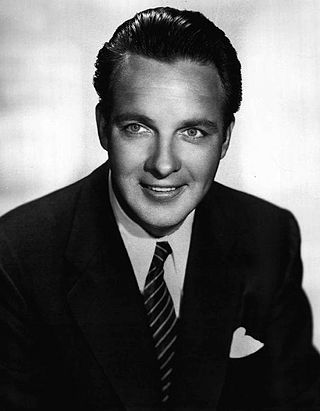
George Robert Crosby was an American jazz singer and bandleader, best known for his group the Bob-Cats, which formed around 1935. The Bob-Cats were a New Orleans Dixieland-style jazz octet. He was the younger brother of famed singer and actor Bing Crosby. On TV, Bob Crosby guest-starred in The Gisele MacKenzie Show. He was also a regular cast member of The Jack Benny Program, on both radio and television, taking over the role of bandleader after Phil Harris' departure. Crosby hosted his own afternoon TV variety show on CBS, The Bob Crosby Show (1953–1957). Crosby received two stars on the Hollywood Walk of Fame, for television and radio.
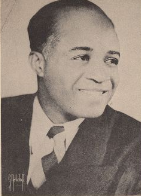
William Franklin was a baritone opera singer who was considered to be a pioneering African American in the Chicago music scene. He has been described as the best baritone of his day, with some performances that "will long be remembered for [their] intensity of musical feeling." He was known for his leading roles in a revival of George Gershwin's Porgy and Bess in 1944, and in Gilbert and Sullivan's The Mikado.
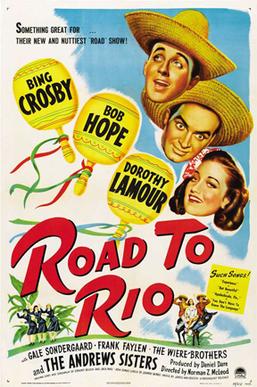
Road to Rio is a 1947 American semimusical comedy film directed by Norman Z. McLeod and starring Bing Crosby, Bob Hope, and Dorothy Lamour. Written by Edmund Beloin and Jack Rose, the film is about two inept vaudevillians who stow away on a Brazilian-bound ocean liner and foil a plot by a sinister hypnotist to marry off her niece to a greedy fortune hunter. Road to Rio was the fifth of the "Road to ..." series.
Phonofilm is an optical sound-on-film system developed by inventors Lee de Forest and Theodore Case in the early 1920s.

Broadway Bill is a 1934 American comedy-drama film directed by Frank Capra and starring Warner Baxter and Myrna Loy. Screenplay by Robert Riskin and based on the short story "Strictly Confidential" by Mark Hellinger, the film is about a man's love for his thoroughbred race horse and the woman who helps him achieve his dreams. Capra disliked the final product, and in an effort to make it more to his liking, he remade the film in 1950 as Riding High. In later years, the distributor of Riding High, Paramount Pictures, acquired the rights to Broadway Bill. The film was released in the United Kingdom as Strictly Confidential.

Cass Daley was an American actress, comedian and singer.

Ray Drummond is an American jazz bassist and teacher. He also has an MBA from Stanford University, hence his linkage to the Stanford Jazz Workshop. He can be heard on hundreds of albums and co-leads The Drummonds with Renee Rosnes and Billy Drummond.

Clarence Muse was an American actor, screenwriter, director, singer, and composer. He was the first African American to appear in a starring role in a film, 1929's Hearts in Dixie. He acted for 50 years, and appeared in more than 150 films. He was inducted into the Black Filmmakers Hall of Fame in 1973.

"Margie", also known as "My Little Margie", is a 1920 popular song composed in collaboration by vaudeville performer and pianist Con Conrad and ragtime pianist J. Russel Robinson, a member of the Original Dixieland Jazz Band. Lyrics were written by Benny Davis, a vaudeville performer and songwriter. The song was introduced by the Original Dixieland Jazz Band in 1920 as Victor 78, 18717-A, in a medley paired with "Singin' the Blues". The B side was "Palesteena". The ODJB recorded their instrumental version on December 1, 1920.

Is Everybody Happy? is an American black and white musical film released in 1943. The movie was in effect a biopic for Ted Lewis.
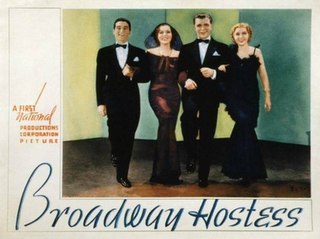
Broadway Hostess is a 1935 American romantic comedy musical film directed by Frank McDonald and starring Wini Shaw, Genevieve Tobin and Lyle Talbot. The film was nominated at the 1935 Academy Awards for the short lived Best Dance Direction category. For which Bobby Connolly was nominated for, along with the film Go into Your Dance.

The Stage Door Canteen was an entertainment venue for American and Allied servicemen that operated in the Broadway theatre district of New York City throughout World War II. Founded by the American Theatre Wing (ATW) in 1942, the entertainers were largely unpaid; volunteering their talents as a way of supporting the morale of American troops during the war. Several women in leadership with the ATW played a critical role in establishing the Stage Door Canteen, including actress Nedda Harrigan and ATW co-founders Louise Heims Beck and Antoinette Perry. The canteen opened March 2, 1942 and operated seven nights a week in the previously unoccupied Little Club under the 44th Street Theatre at 216 West 44th Street in Manhattan.















